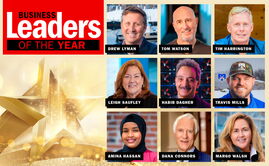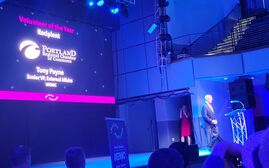
Processing Your Payment
Please do not leave this page until complete. This can take a few moments.
- News
-
Editions
-
- Lists
-
Viewpoints
-
Our Events
-
Event Info
- Women's Leadership Forum 2025
- On the Road with Mainebiz in Bethel
- Health Care Forum 2025
- On The Road with Mainebiz in Greenville
- On The Road with Mainebiz in Waterville
- Small Business Forum 2025
- Outstanding Women in Business Reception 2025
- On The Road with Mainebiz in Bath
- 60 Ideas in 60 Minutes Portland 2025
- 40 Under 40 Awards Reception 2025
- On The Road with Mainebiz in Lewiston / Auburn
- 60 Ideas in 60 Minutes Bangor 2025
Award Honorees
- 2025 Business Leaders of the Year
- 2024 Women to Watch Honorees
- 2024 Business Leaders of the Year
- 2023 NextUp: 40 Under 40 Honorees
- 2023 Women to Watch Honorees
- 2023 Business Leaders of the Year
- 2022 NextUp: 40 Under 40 Honorees
- 2022 Women to Watch Honorees
- 2022 Business Leaders of the Year
-
-
Calendar
-
Biz Marketplace
- News
-
Editions
View Digital Editions
Biweekly Issues
- April 21, 2025 Edition
- April 7, 2025
- March 24, 2025
- March 10, 2025
- Feb. 24, 2025
- Feb. 10, 2025
- + More
Special Editions
- Lists
- Viewpoints
-
Our Events
Event Info
- View all Events
- Women's Leadership Forum 2025
- On the Road with Mainebiz in Bethel
- Health Care Forum 2025
- On The Road with Mainebiz in Greenville
- On The Road with Mainebiz in Waterville
- + More
Award Honorees
- 2025 Business Leaders of the Year
- 2024 Women to Watch Honorees
- 2024 Business Leaders of the Year
- 2023 NextUp: 40 Under 40 Honorees
- 2023 Women to Watch Honorees
- 2023 Business Leaders of the Year
- + More
- 2022 NextUp: 40 Under 40 Honorees
- 2022 Women to Watch Honorees
- 2022 Business Leaders of the Year
- Nomination Forms
- Calendar
- Biz Marketplace
Business Leaders: Margo Walsh uses life experience and persistence to place workers with a history
 Photo / Tim Greenway
Margo Walsh, founder of MaineWorks
Photo / Tim Greenway
Margo Walsh, founder of MaineWorks
The concept behind the name MaineWorks is deceptively simple: Put people to work, right? But in the world led by CEO Margo Walsh, it’s a little more complicated.
Her for-profit B-Corp reaches out to those on the margins that society may want to cast off, such as people who’ve been incarcerated and those in recovery. Walsh’s decision to put alcohol on a shelf was a catalyst behind Maineworks.
“I was a small-time girl from Cumberland who got sober in ‘97 is what happened,” she says about the company’s lift-off. But serendipity had a hand as well.
Because her model is truly unique, as the only program of its kind in the country, Walsh is often in the spotlight. It’s a place she tries to step out of, with mixed success.
“I’m just the idea person,” she insists, sitting in front of a wall of oversized photos of MaineWorks employees taken by her close friend and photographer, Joanne Arnold. “They run the show.”
“They” are the roughly half dozen men who make up the leadership team, including Business Manager Cecil Solaguren and Operations Manager Wes “Buddy” Salvucci.
Walsh, who was named a Mainebiz Woman to Watch in 2014, fondly calls MaineWorks’ base of operations on Forest Avenue “the island of lost boys.”
“The ship sank and everybody’s on the lifeboat,” Walsh says of her close-knit crew.
Mainebiz: You worked in the investment banking division at Goldman Sachs. It seems like a big stretch to go from that to establish a place like MaineWorks.
Margo Walsh: Building on my first internship at Bankers Trust, where I was doing a project about hiring for diversity in 1986, I was part of founding diversity initiatives at both Goldman Sachs and Hewitt Associates. At Goldman Sachs in Connecticut, I founded a roundtable on diversity and I loved it. It was me taking an interest in the people being left out. When I started MaineWorks my intention was to support the most marginalized people who, in this country, are people with felony convictions. From that premise, our hiring has expanded to include other marginalized populations. All of these groups are easily exploited by traditional day labor staffing models, and it was my intention to dignify this type of employment.
MB: How did that play into your decision to start Maineworks?
MW: Really, the impetus was, I was put in a world of service work as part of my recovery. By 2000 I was back in Maine and I volunteered at the Cumberland County Jail at the Milestone wet shelter. I noticed young men in pre-release; most had felonies from Maine State Prison. They’d end up working at Denny’s — it was right next door. I knew people in the construction industry. So I said, ‘I’ll hire them. The only requirement is, they had to be felons.’ It was a disruptive business model. I wanted to do something absolutely against the grain.
MB: How did you assemble your team?
MW: It’s organic. We didn’t recruit anybody; they all walked in off the street with lived experience.
MB: Why did you start a for-profit business instead of a nonprofit?
MW: We put people to work in construction because it’s merit-based. It’s not a charity case. It’s the only program of its kind in the country. I had the idea and an unbelievable optimism about humanity. It’s a perpetual half-glass full. [Wesley Salvucci, the field operations manager, chimes in: “Even people in recovery want to be on their own.”]
MB: What’s your business model? You were the first certified B-Corp in Maine in 2019, which legally obligates you to consider the impact your business decisions have on stakeholders and workers. Does that inform your mission?
MW: My business model is growing a social enterprise network, i.e., like a bakery we sell a product — people. It’s a very B-Corp philosophy.
MB: Is this your final act?
MW: God, no. I have so much to do. We have to connect the billions of dollars available from well-intentioned philanthropy and get people off the streets. That’s my next thing.

About MaineWorks
MaineWorks
207-415-3585
494 Forest Ave., Portland
Founded 2011
Employees 80
2022 sales $3.8 million
What it does: MaineWorks is a Portland employment company that acts as a conduit to work for people who face barriers to employment, including those in recovery from substance use disorder, returning veterans and people with felony convictions. The related 5013c United Recovery Fund was established in 2017 to provide integrative services for marginalized people and new Americans.














0 Comments